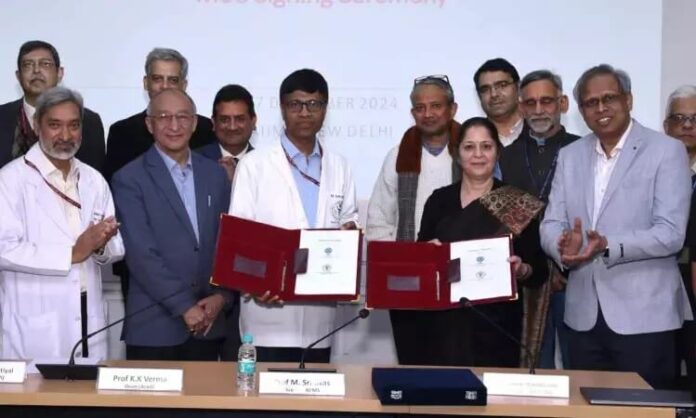The Council of Scientific and Industrial Research (CSIR) and the All India Institute of Medical Sciences (AIIMS), New Delhi, have signed a landmark Memorandum of Understanding (MoU) to advance medical research, enhance healthcare delivery, and address critical health challenges in India.
The MoU, signed on December 17, 2024, at AIIMS New Delhi, aims to establish a robust framework for collaboration, leveraging the expertise and resources of both organizations. This partnership is expected to drive innovation, improve patient outcomes, and address pressing health issues.
In addition to the overarching agreement, a focused MoU was signed between CSIR’s Centre for Cellular & Molecular Biology (CSIR-CCMB), Hyderabad, and AIIMS New Delhi to enable joint research projects and extend the use of CSIR-CCMB’s advanced facilities to AIIMS researchers.
The signing ceremony was attended by Prof. M. Srinivas, Director of AIIMS, senior officials from CSIR, including lab directors from healthcare-focused institutes, and senior faculty and department heads from AIIMS.
Highlighting the collaboration’s potential, Prof. Srinivas remarked, “This partnership will enable us to explore new frontiers in healthcare research and translate findings into practical solutions that improve patient care.”
Dr. Vinay Nandicoori, Director of CSIR-CCMB and Theme Director for CSIR’s Healthcare Initiative, presented key areas of research involving over 15 CSIR labs. These include drug development, affordable healthcare, AI applications in medicine, early cancer detection, biomedical waste management, infectious disease research, and ongoing R&D in areas like sickle cell anemia and cannabis research.
An interactive session between AIIMS faculty and CSIR lab directors explored potential research collaborations in endocrinology, neurology, gastroenterology, cardiology, pulmonary medicine, and other critical fields.
The MoU outlines plans for joint initiatives such as developing medical technologies, diagnostics, and therapeutic devices, along with capacity-building programs and knowledge sharing. Both institutions are committed to ethical research practices and maintaining the highest standards of scientific integrity.
This collaboration sets the stage for transformative advancements in India’s healthcare sector, paving the way for innovative solutions and improved health outcomes.
























